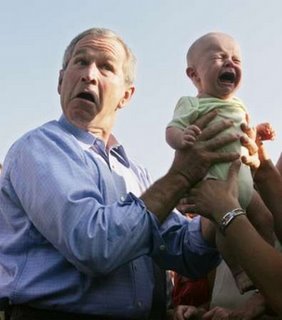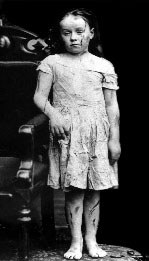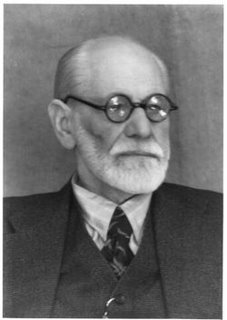 In her post "Art or Abuse," Spunky tells us of Jill Greenberg's exhibition entitled End Times.
In her post "Art or Abuse," Spunky tells us of Jill Greenberg's exhibition entitled End Times.Photographer Jill Greenberg has whipped up a storm of controversy with her new exhibition, End Times. The pictures in the show, for which she deliberately provoked tearful outbursts from children by taking away lollipops she had just given them, have been described by some as tantamount to child abuse.
I do, however, take issue with the term abuse. Those who follow this blog know that I like words and definitions. That I tend toward seeking precision in language usage and particularly in the definitions of words. Most of my personal favorite entries begin with a definition or the etymological history of a word. That's just me and the way I am. My issue with using this word to describe the acts committed against these children in the name of art in no way makes the quality of the transgression any less. I only make that point because Spunky's reply to me seems to indicate that she felt the need to defend the public outrage and shaming of this act which is not something which I take issue with.
Those who follow this blog also know that I tend to use the Webster's 1828. It is almost like a second bible to any PAer. So why did I reach for a legal definition of abuse and not Webster's? Not because I think the state determines what abuse is. In a properly working republic, we the people determine what constitutes abuse based on solid moral conviction (scripture) and encode that into law. And when I read the legal definition of abuse, that appears to be the case.
The Child Abuse Prevention and Treatment Act defines child abuse and neglect as: "at a minimum, any recent act or failure to act on the part of a parent or caretaker,It is specific enough that not every person who disagrees with dominant views on child rearing can be thrown in jail or become the victim of public outrage with accusations of abuse. It is a good definition. And I would expect the basic principles to apply before determining something to be abuse, namely that the action resulted in lasting harm to the child. There are levels of abuse which do not rise to criminal acts, but they should leave some harm to the child before being termed such.
which results in death, serious physical or emotional harm, sexual abuse or exploitation, or an act or failure to act which presents an imminent risk of serious harm."
What is wrong with Webster's? Here is the summary, provided by Shelby:
To use ill; to maltreat; to misuse; to use with bad motives or to wrong purposes. To deceive; to impose on. To treat rudely.I actually addressed specifically why this definition does not hold well to child abuse in Spunky's comments, and I don't wish to take up that much space here. But note how general this is. This is a casual treatment of the word, and open to wide interpretation...interpretation which could also lead to cries of abuse toward homeschoolers who "impose" religious values on their children. Or to parents who "deceive" them about the existence of God (or Santa Clause, for that matter). And leaves every rude remark an unthinking parent has said as abuse.
I can almost guarantee that Noah Webster did not have child abuse on his mind when he wrote this definition. People of his day did not believe that parents could abuse their own children. It was unheard of, not because it didn't exist, but because people just didn't think it possible.
 In April of 1874, Mary Ellen Wilson, a nine year old girl from New York, had been severely abused by her foster mother. She had been beaten, cut, burned, poorly nourished and forced to sleep on a scrap of carpet with a worn out blanket in the coldest of winters. She was never allowed out of doors, and spent her time locked up when her foster mother was away. An excerpt from her testimony in a New York City courtroom in 1874:
In April of 1874, Mary Ellen Wilson, a nine year old girl from New York, had been severely abused by her foster mother. She had been beaten, cut, burned, poorly nourished and forced to sleep on a scrap of carpet with a worn out blanket in the coldest of winters. She was never allowed out of doors, and spent her time locked up when her foster mother was away. An excerpt from her testimony in a New York City courtroom in 1874:My name is Mary Ellen McCormack. I don't know how old I am...I have never had but one pair of shoes, but I can't recollect when that was. I have no shoes or stocking this winter...I have never had on a particle of flannel. My bed at night is only a piece of carpet, stretched on the floor underneath a window, and I sleep in my little undergarment, with a quilt over me. I am never allowed to play with any children or have any company whatever. Mamma has been in the habit of whipping and beating me almost every day. She used to whip me with a twisted whip, a raw hide. The whip always left black and blue marks on my body. I have now on my head two black and blue marks which were made by mamma with the whip, and a cut on the left side of my forehead which was made by a pair of scissors in mamma's hand. She struck me with the scissors and cut me. I have no recollection of ever having been kissed, and have never been kissed by mamma. I have never been taken on my mamma's lap, or caressed or petted. I have never dared to speak to anybode, because if I did I would get whipped...Whenevr mamma went out I was locked up in the bedroom...I have no recollection of ever being in the street in my life."She was actually found tied to a bed. The problem with this case was the prevailing opinion that child abuse did not exist. Neighbors heard the screams and called the police, but no help ever came. One of the neighbors told Etta Wheeler, her nurse, about the girl. She went to police. She went to the church. She went to the courts. All to no avail. She wasn't to interfere between parent and child.
If that isn't twisted enough, consider how she finally was rescued, and the very existence of child abuse was finally recognized and community organization were formed to prevent it. Ms. Wheeler went to Henry Bergh of the American Society for the Prevention of Cruelty to Animals.
She reasoned that children were members of the animal kingdom and could therefore be protected under the laws governing the mistreatment of animals.He disagreed with the strategy, but agreed to help. The girl's case finally was brought to court, she was removed from the home and grew up to get married, have two children of her own and adopt a third. Her case brought about the first organizations to protect children from abuse...after organizations and laws were formed for the protection of animals.
 Interestingly, Sigmund Freud was one of the first to recognize childhood sexual abuse to be a real problem in society. Many of his adult patients reported such abuse and he found it to be causally related to their psychological distress. Victorian society was not ready for such a revelation, however. Scientists and politicians so vociferously denounced the idea, he withdrew the findings. (And seeing as several of them were implicated in the findings, is there any wonder?) That is where all that strange Freudian psychology and his oedipal theory comes from...he then decided that these people had desired these interactions they were reporting to him. That was in 1896.
Interestingly, Sigmund Freud was one of the first to recognize childhood sexual abuse to be a real problem in society. Many of his adult patients reported such abuse and he found it to be causally related to their psychological distress. Victorian society was not ready for such a revelation, however. Scientists and politicians so vociferously denounced the idea, he withdrew the findings. (And seeing as several of them were implicated in the findings, is there any wonder?) That is where all that strange Freudian psychology and his oedipal theory comes from...he then decided that these people had desired these interactions they were reporting to him. That was in 1896.Taking a lollipop away from a child, and perhaps having the parent step out of the room for a few minutes, in order to induce a temper tantrum hardly amounts to the abuse suffered by countless children in this country. The act itself cannot be considered abusive because it will not induce lasting harm. The act itself may be repeated time and time again by good parents and be in no way considered abusive. My children lose treats they do not show appreciation for. Or property they do not treat properly. That alone is not abusive. And millions of parents drop their children off at a friend's or a relative's for some purpose, despite screaming protests from their little ones. That act also is not in and of itself abusive.
What is in question is the motivation alone, not the long-term effect it will have on the child. Should adults be able to profit off of such treatment of a young child? I do have a word for it: exploitation. Webster paints an entirely too positive picture of exploitation, so I'll again go to someone else.
To make use of selfishly or unethicallyThe notion of child exploitation brings up images of two practices: child labor such as that found in, well, most of the world, and the use of children in child sex rings. The latter is obviously not applicable, but the former is. Take, for example, her summary of her thoughts after photographing a crying toddler which originally gave her the inspiration for this exhibit.
"This could go with a caption, 'Four More Years,' like he was appalled at George Bush's reelection. The images have a real power—they immediately get under your skin. The emotion you see is just so compelling, yet they're beautiful at the same time. That was one of the things that interested me about the project—the strength and beauty of the images as images. I also thought they made a kind of political statement about the current state of anxiety a lot of people are in about the future of the country. Sometimes I just feel like crying about the way things are going."The "images as images." They are nothing more than that to her. While the effects may not be lasting, and these children may go on to lead quite normal lives, joking about their moment of fame as a screaming toddler well into their older years, we can still denounce the unethical treatment these children received at the hands of a photographer. And we can do it without broadening the already too broad definition of abuse.
And I might add that at least Bush hands crying babies back to their parents.
If you need something a little more uplifting after that, visit the Carnival of Kid Comedy over at Kim's place!
Greenberg, Jill Greenberg, art, child abuse, homeschooling
